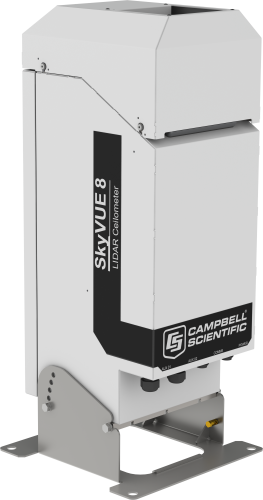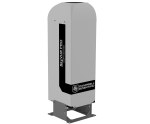
Cloud measurement with state-of-the-art signal processing






Overview
The SkyVue™8 LIDAR Ceilometer is ideal for measuring cloud base heights and vertical visibility at airports, helipads (onshore or offshore), and other meteorological applications. The SkyVue 8 measures the atmosphere with high stability and repeatibility, providing you with information on cloud base heights, sky condition (up to five layers), vertical visibility, and raw backscatter profiles. Notably, the ceilometer meets or exceeds all the necessary ICAO, CAA, and WMO requirements and recommendations.
Because of its robust construction, the SkyVue 8 only requires minimal maintenance and can be continuously used in either static or mobile applications in harsh environments. Its compact design and low weight of 18 kg make it easy to transport and deploy.
With an operational reporting range of 8 km, the SkyVue 8 has one of the highest in its class. It is easy to use yet features advanced signal processing and unique optics to provide superior resolution and performance.
The SkyVue 8 has many standard features, from a tilting base and two-axis inclinometer for automatic correction of cloud base heights to heaters, blowers, and a sun filter for operation under all conditions—making deployments possible around the world.
Unique standard features include an easy-to-operate stratocumulus calibration, long-life back-up battery, and twin clocks to augment its many continuous diagnostic self-checks and provide assurance of continuous, reliable, and accurate performance.
Learn more about our CampbellAero™ Automated Weather Observing System (AWOS) Solution and our CampbellAero Software.
Read MoreBenefits and Features
- Single-lens design for high signal-to-noise ratio and maximized detector sensitivity, resulting in greater performance at low and high altitudes
- High performance and high specification at a competitive price
- Low power consumption
- Tilt angles to 24°, improving performance during precipitation events and reducing impact of solar glare
- Unique continuous comparison of two separate internal quartz clocks to eliminate possibility of clock drift and ensure measurement confidence
- User-friendly stratocumulus calibration capability and easy test with a calibrator plate provided as standard for easy field calibration
Images







Similar Products
Detailed Description
The SkyVue 8 LIDAR ceilometer measures cloud base heights and vertical visibility for meteorological and aviation applications. Using LIDAR (LIght Detection And Ranging) technology, the ceilometer transmits fast, low-power laser pulses (not harmful to eyes) into the atmosphere and detects backscattered returns from clouds and aerosols above the instrument.
A unique, efficient, single-lens design increases optical signal-to-noise ratio and allows for larger optics in a compact package, improving accuracy and measurement performance.
This approach, along with state-of-the-art electronics, provides a powerful and stable platform from which to measure cloud base heights and vertical visibility to high accuracy. The SkyVue 8 measures the atmosphere with high stability and repeatability, delivering excellent performance in even the harshest of conditions.
The SkyVue 8 provides information on cloud base heights, sky condition (up to five layers), vertical visibility, and raw backscatter profiles to a range of 8 km.
The unique stratocumulus calibration capability, which allows users to calibrate measurements of scatter coefficients, uses a simple and user-friendly field method, giving complete confidence in the scatter profiles reported and removes the requirement to have the unit sent back for calibration.
Reliable range measurement is further assured by cross-checking two separate internal quartz clocks, eliminating the possibility of unidentified errors due to clock drift.
The SkyVue 8 can be tilted at various angles up to 24°. Tilting the SkyVue 8 by even a few degrees can be important, as it allows the ceilometer to resist high levels of reflection from large raindrops and frozen particles that can impair vertical-type sensors. The tilt also improves rain run-off on the ceilometer window, resulting in a much higher performance compared with vertical ceilometers.
Tilting to 24° also means that it can be operated anywhere in the world without the sun shining into the lens and resulting in missing data. An internal two-axis inclinometer provides automatic correction of cloud base heights at all angles, ensuring ease of installation and confidence that cloud base heights are automatically corrected throughout the lifetime of the installation.
The SkyVue 8 complies with ICAO, CAA, and WMO guidance and meets or exceeds all recommendations and specifications. (This includes ICAO 9837, ICAO Annex 3, CAP437, and CAP746.)
Software for data visualization and interpretation
Ceilometer data can be displayed using Campbell’s Viewpoint software or fed directly into existing data systems. The Campbell Viewpoint software will display the output from the ceilometer in a convenient and configurable form, including information on sky condition, mixing layers, scatter profiles, etc. All can be displayed simultaneously or separately with ranges and time scales. For more information on Viewpoint click here.
Specifications
| Dimensions | 737 x 294 x 240 mm (29.0 x 11.6 x 9.5 in.) including tilt base |
| Power Supply Cable Length | 10.06 m (33 ft) |
| Data Cable Length | 10.06 m (33 ft) |
| Weight | 18 kg (39.7 lb) |
Instrument Performance |
|
| Reporting Range | 0 to 8 km (0 to 26,250 ft) |
| Minimum Reporting Resolution | 5 m (16.4 ft) |
| Hard Target Range Accuracy | ±0.25%, ±4.6 m (15.1 ft) |
| Reporting Cycle | 2 to 600 s |
| Cloud Layers Reported | Up to four layers |
| Sky Condition | Up to five layers with cover in oktas according to WMO requirements for SYNOP and METAR codes as standard |
| Vertical Visibility | Reported when there is obscuration but no clouds detected |
| Laser Type | InGaAs |
| Laser Wavelength | 912 nm (±5 nm) |
Electrical Specification |
|
| Power Source |
|
| Battery | Internal 12 V 7 Ah battery backup |
| Interfaces |
|
Environmental Specification |
|
| Temperature Range |
|
| Humidity Range | 0 to 100% RH |
| IP Rating | IP66 (NEMA 4X) |
| Maximum Wind Speed | 55 m/s (123 mph) |
Compliance and Testing |
|
| -NOTE- | Further details regarding compliance and testing are available upon request. |
| EMC Compliance | EN 61326-1:2013 |
| Electrical Safety Compliance | EN 61010-1:2010 |
| Laser Safety Compliance | EN 60825-1:2014 |
| Eye Safety Standard | Class 1M |
| Vibration | BS EN 60068-2-6:2008 Test Fc: Vibration (Sinusoidal) |
| Frequency Range | 5 to 150 Hz (exceeds Lloyd's Register test levels) |
Compatibility
Documents
Brochures
Manuals
Compliance
Frequently Asked Questions
Number of FAQs related to SkyVue 8: 1
-
The cloud ceiling height relates to the height of the base of the cloud where the sky is overcast or has broken cloud cover.
Case Studies
Background Manitouwadge Municipal Airport is located 48 km (29.8 mi) north of highway 17 on Highway......read more
Privacy Policy Update
We've updated our privacy policy. Learn More
Cookie Consent
Update your cookie preferences. Update Cookie Preferences

